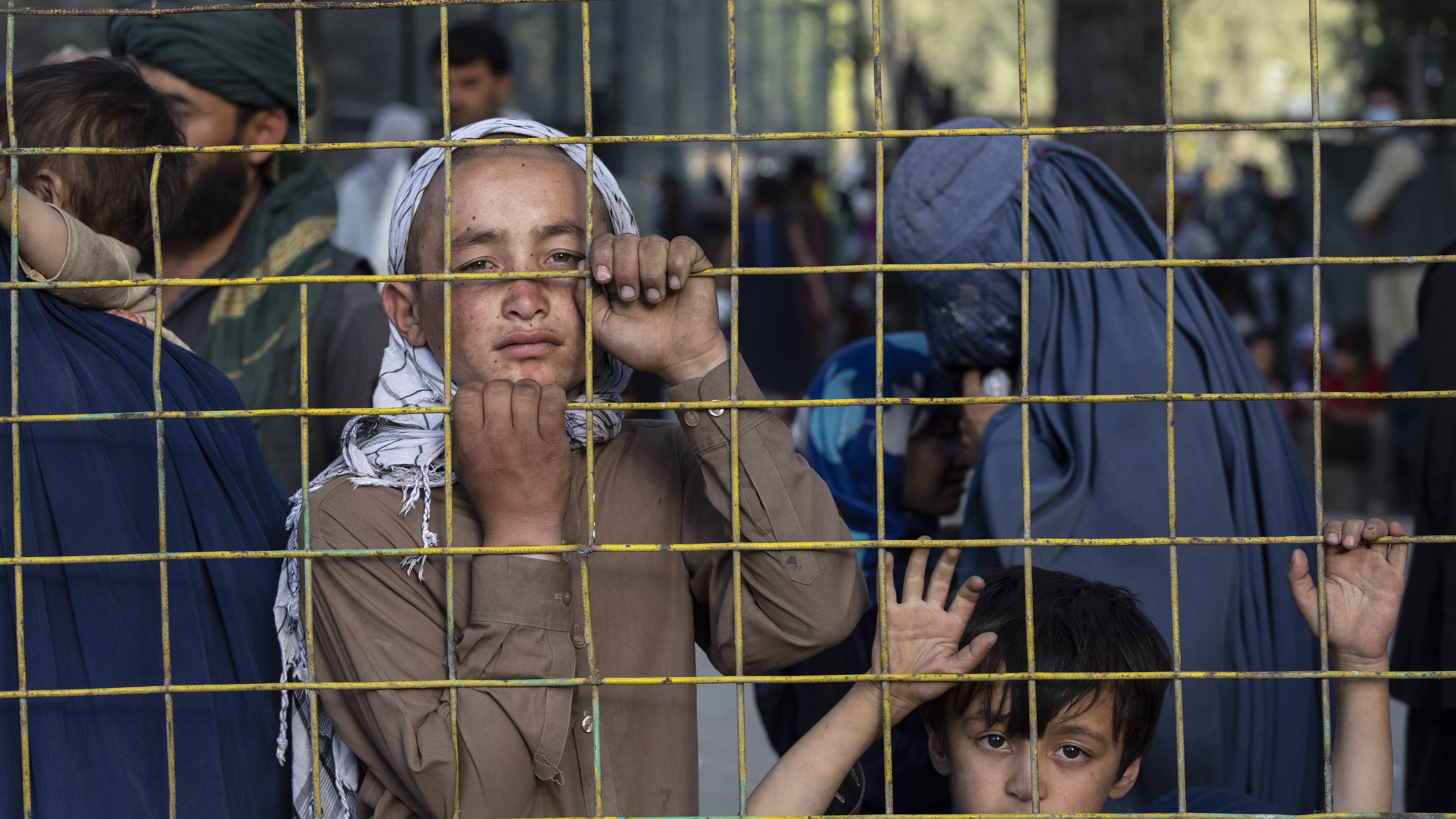How to Help Afghanistan Refugees and Those Who Need Aid
With the situation rapidly evolving, organizations are desperate for help.


With the Taliban solidifying control over Afghanistan, citizens and residents, especially women, are pleading for assistance. As people desperately try to flee, it's been mayhem at airports and at borders as neighboring countries see an influx of refugees. The situation is dire and ongoing, and the U.S. has dispatched thousands of troops to aid in evacuation. So what can the average person do to help?
First, it might seemingly go without saying, but petitioning your elected officials and speaking out in support of aid for those in Afghanistan can offer an incentive for them to act. Second, you can learn more from verified news sources about the conflict and what's going on so that you can continue to advocate for action and (critically) keep the crisis in people's minds. You can also sign petitions to help ensure women's rights, create safe passages, and raise awareness of refugee mistreatment if you don't have the funds to support monetarily right now.
Finally, several organizations that provide assistance in Afghanistan are calling for aid during this time. Some areas are impossible for humanitarians to reach, especially right now, thus it helps to support organizations that have pathways to provide in-person and remote support already. Below are a few of these organizations, as well as details on how they provide assistance.
Women for Women International
Women for Women International works to provide paths towards equity and security for women in countries like Afghanistan. They've paused their programming so they can work on helping people get visas, raise funds, help women meet safely, and call on government aid. They're asking for support, and some donors are promising to match gifts, so your donation goes further than it might otherwise. You can read more about what Women for Women and donate directly.
Thank you for the overwhelming love and support we’ve received in the past 48 hours. Many of you are deeply concerned and have asked us what we are doing to help our colleagues get out of #Afghanistan. 1/5 pic.twitter.com/Og6XJrAJ2kAugust 17, 2021
Lutheran Immigration and Refugee Service (LIRS)
You may be in a local area, such as D.C., where you can offer as a volunteer to aid resettled Afghans. At this LIRS link, you can determine if you live in one of the high-traffic areas and volunteer your house or supplies. If you don't live anywhere where direct services are being provided to evacuees, you can donate to associated organization Neighbors in Need: Afghan Allies that provides resources to the refugees once they're relocated.
Doctors Without Borders (MSF)
MSF is widening its medical support ranging from maternal care to trauma services. They're continuing to provide a presence in Herat, Kandahar, Khost, Kunduz, and Lashkar Gah, despite many other organizations working to evacuate their staff right now. You can learn more and donate.
The @MSF maternity hospital in #Khost usually focuses on complicated or at risk pregnancies but when instability erupted, making accessing other facilities more difficult, we widened our admission criteria to ensure safe maternal and neonatal care for all.August 17, 2021
Miles4Migrants
As reported in People, the organization, which was founded in 2016, lets you use "frequent flyer miles, credit card points and money to fly refugees, asylees, asylum seekers, and their family members to safety and new homes." Since Kabul's airport is currently closed, they can't book actual flights, but they are still accepting donations and hoping to be able to start flying people again soon. You can learn more and donate—a strong option for people who might not have cash but do have gift cards, cancelled flight vouchers, and other alternate forms of payment.
Get exclusive access to fashion and beauty trends, hot-off-the-press celebrity news, and more.
The United Nations Refugee Agency (UNHCR)
UNHCR works directly with refugees, protecting displaced people and providing emergency assistance. They're calling upon countries and advising ways to help at the national level, publishing a new advisory to halt forcible returns of Afghan nationals. You can support them and learn more.
International Rescue Committee (IRC)
The IRC just launched a $10 million appeal to raise funds for the emergency response in Afghanistan, explaining that "the humanitarian response remains just 38 percent funded." Money will go towards their teams to provide aid and directly to displaced individuals. Learn more about their work and donate.
The latest increase in fighting in #Afghanistan has put record levels of civilians in danger, with women and girls bearing the brunt of the violence. The severity of the situation brings new urgency to ensure all Afghans in need of aid can be reached. https://t.co/CkTjm6gfwm pic.twitter.com/rObi8Xj0CoAugust 15, 2021
Committee to Protect Journalists (CPJ)
The CPJ works to protect journalists around the world; by their count, at least 53 journalists have been killed in Afghanistan since 2001, and five were killed in 2020. They've just intensified their work with partners and government officials to help Afghan journalists find safety. At least 300 registered journalists are currently attempting to flee to safety and hundreds more are under review; many of them are in hiding. Learn more about their work and donate.
Save the Children
As the name implies, Save the Children has long worked directly with Afghan children to offer food security, safety, and other forms of aid. They've said they're committed to help in this crisis, even though they've had to suspend regular services. You can learn more about their work and donate here.
There are other organizations, too, including the International Committee of the Red Cross, which for several decades has provided medical personnel and equipment in the country. Wherever you choose to contribute, always try to verify the organization and its specific work before you donate. As shown above, their social media can provide some insight on how they're utilizing aid—and whether they're even asking for it right now. If you don't know how else to help, you can amplify the work of the above organizations.
Correction: This story was updated to reflect the ongoing work of the ICRC in Afghanistan.

Katherine’s a contributing syndications editor at Marie Claire who covers fashion, culture, and lifestyle. In her role, she writes stories that are syndicated by MSN and other outlets. She’s been a full-time freelancer for over a decade and has had roles with Cosmopolitan (where she covered lifestyle, culture, and fashion SEO content) and Bustle (where she was their movies and culture writer). She has bylines in New York Times, Parents, InStyle, Refinery29, and elsewhere. Her work has also been syndicated by ELLE, Harper’s Bazaar, Seventeen, Good Housekeeping, and Women’s Health, among others. In addition to her stories reaching millions of readers, content she's written and edited has qualified for a Bell Ringer Award and received a Communicator Award.
Katherine has a BA in English and art history from the University of Notre Dame and an MA in art business from the Sotheby's Institute of Art (with a focus on marketing/communications). She covers a wide breadth of topics: she's written about how to find the very best petite jeans, how sustainable travel has found its footing on Instagram, and what it's like to be a professional advice-giver in the modern world. Her personal essays have run the gamut from learning to dress as a queer woman to navigating food allergies as a mom. She also has deep knowledge of SEO/EATT, affiliate revenue, commerce, and social media; she regularly edits the work of other writers. She speaks at writing-related events and podcasts about freelancing and journalism, mentors students and other new writers, and consults on coursework. Currently, Katherine lives in Boston with her husband and two kids, and you can follow her on Instagram. If you're wondering about her last name, it’s “I go to dinner,” not “Her huge ego,” but she responds to both.